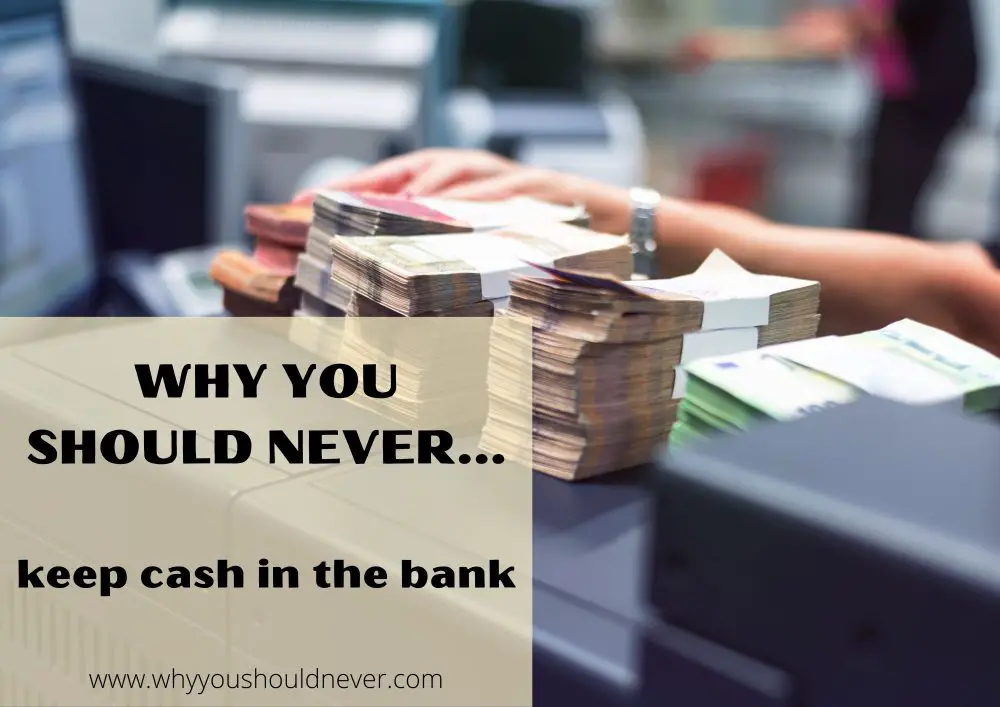![]()
Why You Should Never Keep Cash In The Bank
Banks are the worst! They’re always taking your money in fees, and they’re never there when you need them. They’re more concerned with making money for themselves and bailing out other banks than they are with helping you.
The trouble is, in most cases, you really don’t have much choice but to keep your money in a bank. When you get paid, your employer is going to deposit your paycheck into a bank. And when you go to pay your bills, you’re going to need to use a bank account.
While keeping your money in a bank might seem like the safest option, it’s actually not as safe as you think. In this article, we’ll explore some of the reasons why leaving your hard-earned cash in a bank is not a wise move.
8 reasons why you shouldn’t keep cash in the bank
1. Cash loses its purchasing power over time
One of the biggest dangers of keeping cash in the bank is that it loses its purchasing power over time. This is because of inflation; as prices go up, your cash becomes worth less and less.
For example, let’s say you have $100 in the bank. In 10 years, prices might have gone up by 10%. This means that your $100 can now only buy what $90 could buy today. In other words, your purchasing power has decreased by 10%.
2. Cash deposited into the bank is subject to lending
When you deposit cash into the bank, it becomes immediately subject to lending. In other words, the bank can use your money to lend to other people or businesses. It’s one of the things you agreed to when you opened your account.
While this isn’t necessarily a bad thing, it does mean that, in theory, there’s a risk that the bank could lend out all of your money and then collapse. This is called a bank run, and it’s one of the reasons why banks keep a reserve of cash on hand.
3. Banks can restrict access to your cash at any time
Another downside of keeping cash in the bank is that banks can restrict access to your money whenever they like.
If there was a run on the banks and people started withdrawing large sums of cash all at once, the banks would likely put a limit on how much cash you could withdraw, or simply prevent you from accessing your account altogether.
We saw this happen in Cyprus in 2013 when Cypriot banks confiscated people’s savings above €100,000.
4. Banks can freeze your account at any time
In addition to limiting your access, banks can also freeze your account without notice or explanation.
This usually happens if the bank suspects that you’re involved in criminal activity. But it could also happen for other reasons, such as if you hold unpopular opinions, as was the case with the Canadian Freedom Convey Truckers in February 2022.
This, as you can imagine, would be extremely inconvenient. And if your account is frozen, you may not be able to access your money for a long time, if at all. That means you’ll be unable to pay your rent, bills, and other expenses.
5. Banks charge fees
Banks are always looking for ways to make more money, and one way they do this is by charging their customers fees. These fees can be for a variety of things, such as withdrawing cash from an ATM, transferring money to an international account, or even just having an account with the bank.
These fees can add up over time, and they can eat into your savings. For example, if you have $1,000 in the bank and the bank charges a $5 monthly fee, that’s $60 per year or 6% of your savings.
6. Banks pay very low interest rates
One of the biggest reasons not to keep cash in the bank is that banks pay extremely low interest rates to their customers. In fact, in many cases, the interest rate isn’t even enough to keep up with inflation.
What’s more, they make far more from you than they pay you in interest, through things like overdraft fees and foreign transaction fees. All in all, it’s a pretty bad deal for consumers.
If earning interest is important to you (as it should be), then look into some high-interest paying savings or investment accounts. There are plenty out there that pay upwards of 5% per year.
7. Banks sometimes restrict your ability to buy certain things
We know it might be hard to believe, seeing as it’s your money and you should be the only person with an absolute say over what you can and can’t buy with it. But banks do sometimes put restrictions on what you’re able to purchase, as was the case in 2021 when UK bank TSB banned crypto-buying.
Many banks simply won’t let you use your debit card or bank account to buy cryptocurrency, with some even going as far as permanently shutting down the accounts of those who do.
8. There’s always the risk of the bank going bust
While this is an unlikely scenario, it’s still a possibility nevertheless. If the bank were to go under and there were no buyers for its assets, then depositors might not get all their money back.
So even though your money is technically insured by whatever country you live in (up to a certain amount), there’s still a small risk involved with keeping cash in the bank.
Conclusion
For the most part, banks are a relatively secure place to keep your money. But that doesn’t mean there aren’t risks involved.
So when it comes down to it, you need to weigh up the pros and cons of keeping cash in the bank and decide whether or not it’s right for you. Just remember, it’s always important to have a reserve of cash on hand in case of an emergency.
